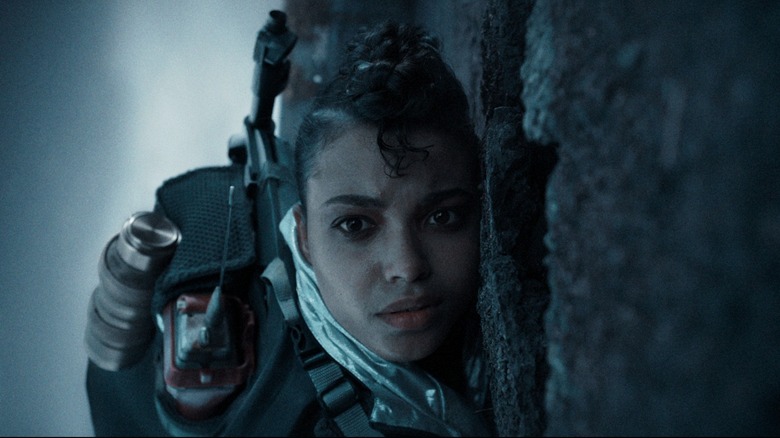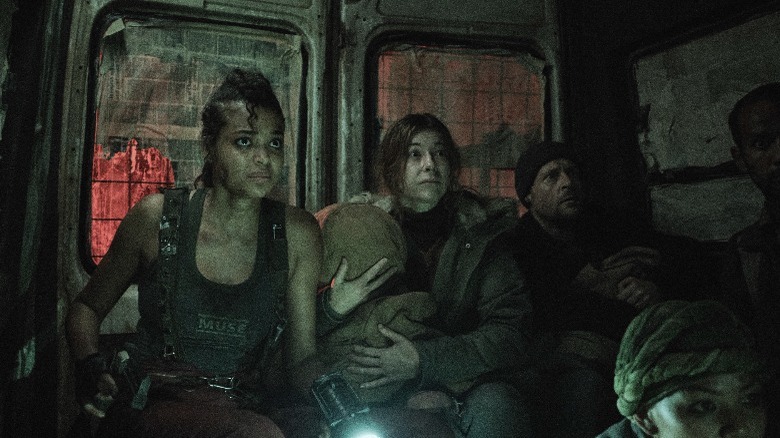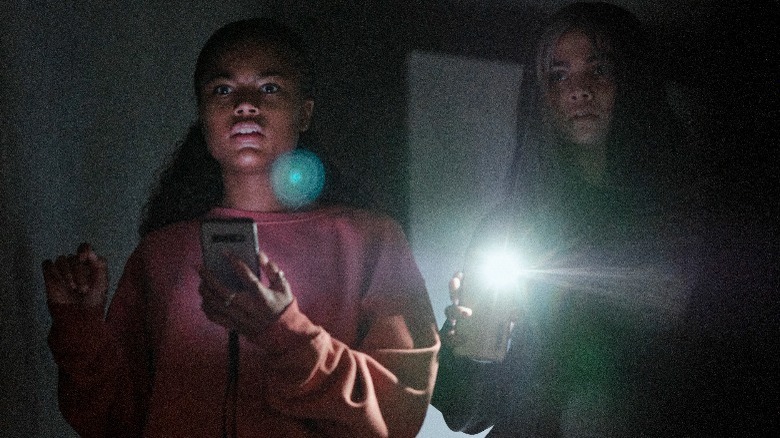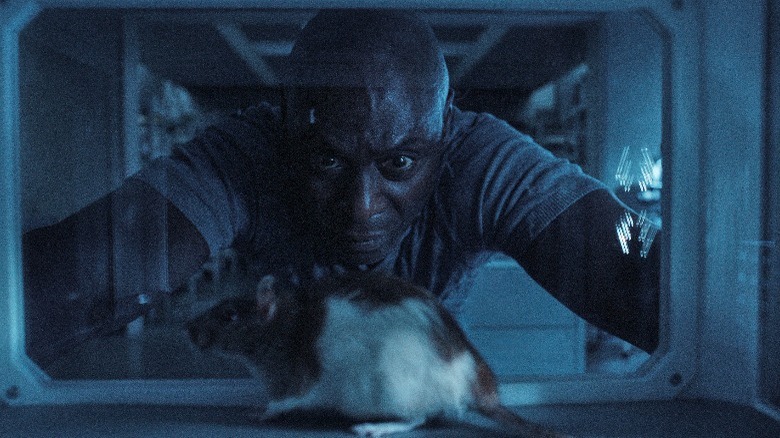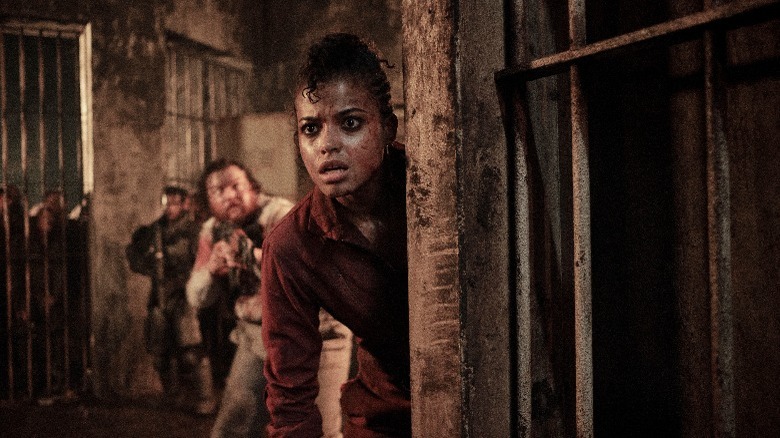The Resident Evil Netflix Series Should've Taken A Big Lesson From The Original Games
Warning: Major spoilers ahead for Netflix's "Resident Evil" series.
Video game adaptations have always sported a mixed, murky history. Most attempts to translate beloved video game storylines into live-action have failed miserably, for the most part. There are some delightful exceptions — for instance, 2021's "Mortal Kombat" was a marked improvement from its previous adaptations, managing to capture the essence of the games, while still delivering on the character front. However, most video game adaptations are messy and shoddy at best, key examples being 2016's mindlessly boring "Assassins Creed" and the absolute butchering of the "Alone in the Dark" franchise by Uwe Boll.
Fans of the "Resident Evil" gaming franchise will understand my frustration when it comes to its long history of (mostly garbage) adaptations. While the Paul W.S. Anderson films moved away from the basic premise of the games, heading towards increasingly-bizarre sensibilities, the most recent "Welcome to Raccoon City," while rooted in the game's history and lore, leaned more towards action-heavy shenanigans.
The latest Netflix adaptation of the games, titled "Resident Evil," fails to (yet again) understand the core essence that made the games so special. Although narratively rooted in the storyline of the first two "Resident Evil" games, the series is a superficial foray into the lore of this rich, complex universe, merely name-dropping and completely repurposing characters for no good reason. Here's how the new series should have captured the appeal of the original games.
Maintaining a consistently unsettling tone
When you're powering through a "Resident Evil" game, especially one like "Resident Evil: Village," the player is forced to maintain a delicate balance between surviving unimaginable horrors via resource management and blowing up endless monsters with the aid of deft combat. The eeriness evoked by the mere atmosphere of the game is a staple in the game series, one that is completely missing in the Netflix series. Although the adaptation has a promising premise on paper — the story alternates between the 2022 and 2036 timelines, juxtaposing what triggered an apocalypse and its aftermath — the execution is shoddy, and even the most adrenaline-fueled moments are devoid of true agency.
There are plenty of monsters in the new series, and they are the result of a deadly mutation, thanks to the spread of the fatal T-virus, but even the scariest beasts (including feral zombies and massive arachnids) do not have the same effect as the one in the game. Juxtapose the deformed baby that chases players through the basement in "Village," or even the Regenerator (who can only be killed in a specific way) suddenly coming to life in "Resident Evil 4," with these generic mutated monsters, and the gulf is extremely wide.
Granted, even the most well-crafted adaptations cannot trump the tense immersion of engaging with a playable character due to the difference inherent in the two mediums, but the action-horror elements in "Resident Evil" are too tame and run-of-the-mill to be effective.
No puzzles? What a shame...
Apart from the frightening zombified creatures that one has to fight off in the games, the integral parts of any "Resident Evil" game are its puzzles. The puzzles are often deliberately challenging, as there is such thing as a safe space in these games, and you can never be too immersed in solving sliders or rearranging tombstones, lest you be chomped to bits by a lurking creature. Netflix's "Resident Evil" completely sidelines this aspect, as the show is too busy playing out the family drama of the Weskers back in 2022, along with cutting back to Jade Wesker (Ella Balinska) and her incredibly thick plot armor in 2036, which dilutes the viewer's immersion.
There was immense potential here, sadly, as the episode "Home Movies" captures the investigative aspect of the games to an extent, where a young Jade (Tamara Smart) and Billie (Siena Agudong) search for clues about their father's mysterious past. This allows for the show to actually pause and focus on the characters, offering a welcome break from the kinetic (and messy) action, and bringing in an element of mystery that works in favor of the episodes. Unfortunately, this moment does not last, as the show is busy with adult Jade meeting new characters who are only killed off abruptly, while her arc is painted in a way that does not quite inspire consistent empathy or interest, for that matter.
The question of Albert Wesker
Dr. Albert Wesker is a seminal character in the games, as he is someone with a complicated backstory and legacy. Originally working as a virologist and senior researcher for Umbrella Corporation, Wesker eventually defects from them and becomes the Captain of Special Tactics and Rescue Service (S.T.A.R.S, which Chris Redfield and Jill Valentine were a part of). This is not redemption enough, of course, as Wesker is very much an antihero who ultimately believed that he was "chosen" for the mass extinction of humanity, and was killed during an operation for his doomsday project, Uroboros.
In the series, Albert Wesker (Lance Reddick) is apparently a family man, father to Jade and Billy. Here, he is also a top researcher for Umbrella, working on the T-Virus, but his arc paints him as someone taking a moralist stance on Umbrella CEO Evelyn Marcus (Paola Núñez), when she intends to use the controversial happiness pill, Joy, for mass profits. Later on, he is revealed to be one of many Albert Wesker clones (the show follows the death storyline of the games), with degenerative tissue disease which forced him to inject his daughters' blood to stay alive. This trope has been borrowed from the "Alice clones" storyline in Anderson's "Resident Evil: Extinction" and "Final Chapter" — emerging as a rather lazy choice in terms of storytelling.
While Reddick is great with the material he is given, his character is a far cry from the Wesker in the games, in a way that does not even faintly echo what the original character stands for. While it is okay to have a revisionist approach to canon, it needs to work in a way that sticks the landing — and in this case, it does not.
Would adapting an in-game storyline work?
While Netflix's "Resident Evil" might continue its frankly lackluster tale if it is renewed for a second season, the series will most likely continue with its focus on Jade while shoehorning original game characters (like Ada Wong). Hopefully, there will be significant improvements in how they portray Umbrella and their motivations, as here, it simply comes off as rooted in capitalist greed and general incompetency instead of the one put forward strongly in the games: an interest in controlling eugenics and creating a race of virally-enhanced superhumans that can be controlled. While this aspect is hinted at in the 2036 storyline, the Umbrella Corporation members in this timeline are cartoonish and lack convincing motivations.
If "Resident Evil" is to be adapted in the near future, it could stick to the original storyline of the first few game installments, namely S.T.A.R.S. teams designed to investigate Raccoon City, being stranded in a dangerous place swarming with monsters. While this premise is utilized in "Welcome to Raccoon City," the film failed to capture the tone and aura of the games. Perhaps a choose your own path structure like that of "Bandersnatch" could help the adaptation edge closer to the vibe of the games, with a script that balances the survival horror elements with meaningful action, wrapped in an investigative mystery that unearths the secrets of the Umbrella Corporation. But hey, that's just me.
All eight episodes of "Resident Evil" are currently streaming on Netflix.
